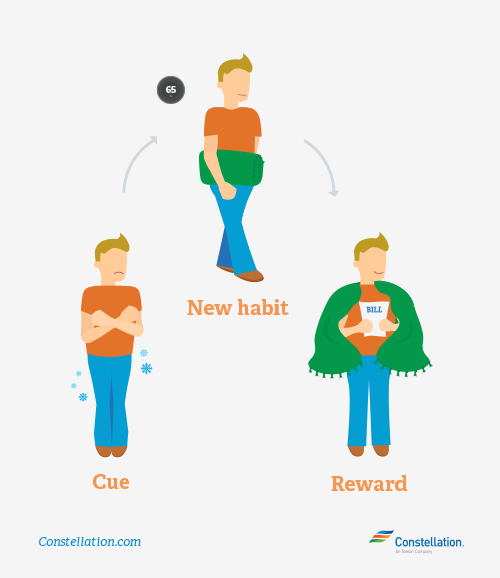- Home Page
- Energy 101: Resources to Help Understand Energy
- What Is Energy Conservation?
What Is Energy Conservation?
Energy conservation is the decision and practice of using less energy. Turning off the light when you leave the room, unplugging appliances when they’re not in use and walking instead of driving are all examples of energy conservation. The two main reasons people conserve energy are to gain more control over their energy bill and reduce the demand on the earth’s natural resources.

Ready to get a handle on your home energy use? Find fixed-rate plans in your area:
Energy Conservation vs. Energy Efficiency: What is the difference?
Energy conservation and efficiency may be related, but they have distinct definitions in the energy world. Energy conservation involves using less energy by adjusting your behaviors and habits. Energy efficiency, on the other hand, involves using technology that requires less energy to perform the same function. Energy-saving light bulbs, large household appliances, smart thermostats, and smart home hubs like Constellation Connect are all examples of technology that can be energy efficient.
10 Energy Conservation Ideas
So why is it important to conserve energy? While energy efficiency might cost you money up front before potentially saving you money down the road, energy conservation is something you can put into practice immediately, either at very little or no cost to you. Here are 10 energy conservation ideas you can get started with today.
- Turn your refrigerator down. Refrigerators account for as much as 13.7% of the total household energy use. To increase energy savings, set your fridge to 37 degrees Fahrenheit and your freezer to 3 degrees Fahrenheit.
- Use energy-efficient light bulbs. Install energy-saving CFL or LED bulbs in your lighting fixtures to use 25-35 percent less energy, compared to regular incandescent bulbs.
- Clean or replace air filters as recommended. The air conditioner and heater are the biggest energy users in most homes, and these appliances have to work even harder with dirty air filters. Write the date of installation on the filter to help you remember when it needs to be replaced.
- Do full loads. Make sure your dishwasher and washing machine are full before running them to get the most energy-saving use from each run cycle.
- Use smart power strips. Even when not in use, household electronics still draw power from outlets. This phenomenon is called “phantom load”. Energy-saving smart power strips, which shut down appliances that have gone into standby mode, help you cut down on phantom-load costs, potentially resulting in money and energy savings.
- Air-dry dishes and clothes. Instead of using your dishwasher’s drying feature, consider letting the dishes air-dry. And instead of using the dryer on a nice day, hang your clothes outside to dry.
- Bake with glass or ceramic pans. You can set the oven’s temperature 25 degrees lower than indicated in the recipe when you do this.
- Cook using the right-sized burner. Conserve energy by using your stove’s small burners for small pots and large burners for large pots.
- Cut down on air leaks in your home. You’re paying for warm air in the winter and cool air in the summer — don’t let that money escape! Check your windows and doors for cracks and gaps, and seal them up with new weather stripping or caulk.
- Keep your house a little hotter in the summer and a little cooler in the winter. Opt for wearing lighter clothes in the summer and wearing a few extra layers in the winter in exchange for those few degrees’ change in temperature. A good rule of thumb is to set the thermostat to 68 degrees Fahrenheit in the winter and to 78 in the summer.
Rewarding Energy Conservation In Your Home
When you’re taking steps toward energy conservation and efficiency, changing your daily energy habits is key to managing your energy usage. Being aware of cues (like feeling cold) can help you focus on a new, rewarding habit (grabbing a blanket instead of raising the thermostat).
Here’s another energy conservation idea — turn down the thermostat on your gas or electric water heater. Most traditional or energy-efficient water heaters are set to keep water heated to 140 degrees Fahrenheit, but water at 120 degrees works just as well.

More resources and tips on saving energy
Check out these resources for more energy conservation ideas:
- How Shade Landscaping Can Help Home Energy Conservation
- Home Energy Savings Series: Radiant Floor Heating
- Home Energy Savings: Dimmers, Switches, Motion Sensors & Timers
- Tiny Houses: Energy Efficiency Spotlight
- The Power of Habit: Changing Energy Consumption Habits
- 22 Earth Day Activities to Help the Planet
- How to Choose Solar Lights for Your Home
- Home Energy Savings Series: Door Sealing and Weather Stripping